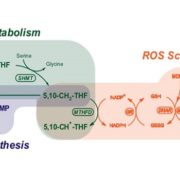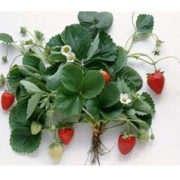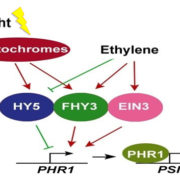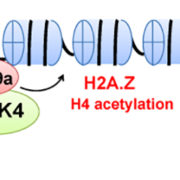
Folate Metabolism Linked to Redox Balance in Arabidopsis
Blog, Research, Research Blog, The Plant Cell, The Plant Cell: In BriefFolates are soluble B9 vitamins with essential functions in all kingdoms of life—both in organisms that produce these vitamins de novo (fungi, plants, and most microorganisms) and in those that do not (animals). As essential cofactors in one-carbon transfers, different folate species mediate the biosynthesis…

Plant Cell EIC Sabeeha Merchant meets with Chinese plant scientists
Blog, Research, Research Blog, The Plant Cell, The Plant Cell: NewsSabeeha Merchant, Editor-in-Chief of The Plant Cell, recently spent a week in China meeting with Chinese scientists at SIPPE (Shanghai Institute of Plant Physiology and Ecology) and FAFU (Fujian Agriculturlal and Forstry University) to learn about their research. She emphasized the power of technology…

Recognizing Plant Cell first authors: Jamie Waese
Blog, Research, Research Blog, The Plant Cell, The Plant Cell: Author ProfilesJamie Waese, featured first author of ePlant: Visualizing and Exploring Multiple Levels of Data for Hypothesis Generation in Plant Biology
Current Position: Senior Manager, Data Visualization Lab, Department of Enterprise Advanced Analytics, TD Bank, Toronto, Canada.
Education: PhD (2017) in Data…

Recognizing Plant Cell first authors: James K. McCarthy
Blog, Research, Research Blog, The Plant Cell: Author ProfilesJames K. McCarthy, featured first author of Nitrate Reductase Knockout Uncouples Nitrate Transport from Nitrate Assimilation and Drives Repartitioning of Carbon Flux in a Model Pennate Diatom
Current Position: Research Fellow, J. Craig Venter Institute, La Jolla, CA.
Education: Ph. D. Microbiology…

Flowering Versus Runnering: A Very Important Decision in Strawberry
Research, The Plant Cell, The Plant Cell: In a NutshellTenreira et al. find a gene responsible for the differentiation of the stolon in strawberry. The Plant Cell 2017. https://doi.org/10.1105/tpc.16.00949
Asexual reproduction produces offspring that are genetically identical to the parents. This process takes many forms in flowering plants, including…

Light Helps Plants Cope with Phosphate Starvation
Research, The Plant Cell, The Plant Cell: In a NutshellLiu et al. focus on transcriptional regulation of PHR1 expression. The Plant Cell 2017. https://doi.org/10.1105/tpc.17.00268
Phosphorus (P) is an essential micronutrient for plant growth, development, and metabolism. Phosphate (Pi), the major form of P used by plants, is highly immobile in most soils,…

How Does Histone Phosphorylation Affect Flowering Time?
Research, The Plant Cell, The Plant Cell: In a NutshellSu et al. look at chromatin modifications that affect flowering. The Plant Cell 2017. https://doi.org/10.1105/tpc.17.00266
Plants, unlike animals, begin their lives as seeds that – in flowering plants – develop from flowers. This depends upon proper regulation of flowering time, to ensure pollination,…

Getting It Done On Time: How Maize Orders DNA Replication
Research, The Plant Cell, The Plant Cell: In a NutshellWear et al. examine replication programs in plants. The Plant Cell 2017. https://doi.org/10.1105/tpc.17.00037
By William Thompson, Emily Wear, and Linda Hanley-Bowdoin
DNA replication is fundamental to all life, as it is the process by which genetic material is duplicated so it can be passed from…

Tiny Mutation Linked to Tastier Tomatoes
Research, The Plant Cell, The Plant Cell: In a NutshellYe et al. discover a gene affecting tomato flavor. The Plant Cell 2017. https://doi.org/10.1105/tpc.17.00211
By Jie Ye
Malate—a widely occurring organic acid in plants—is an important contributor to taste. Variation in acid content has a much greater impact on flavor than does the limited…

